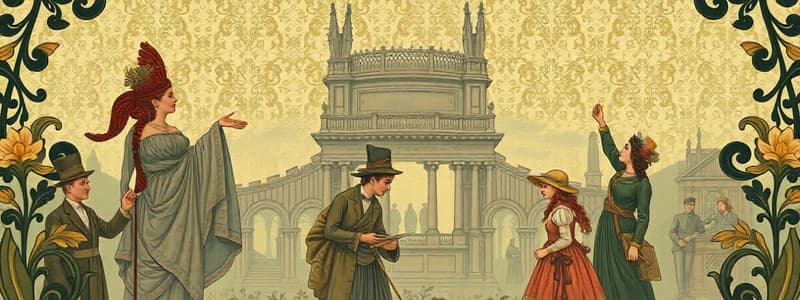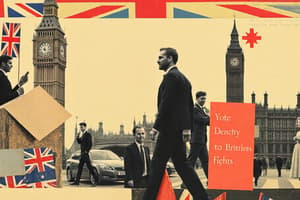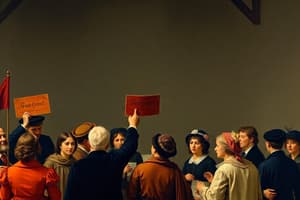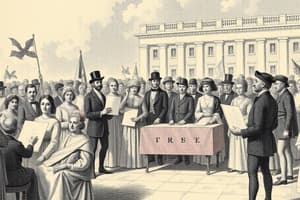Podcast
Questions and Answers
Which of the following was NOT a reform enacted by the Reform Bill of 1832?
Which of the following was NOT a reform enacted by the Reform Bill of 1832?
- It gave industrial cities more representation in Parliament.
- It eased property requirements for voting, allowing wealthy middle class to vote.
- It granted the right to vote to all landowners. (correct)
- It increased the power of the House of Commons by giving them more representation.
What is the significance of the term 'suffrage' in the context of the provided text?
What is the significance of the term 'suffrage' in the context of the provided text?
- The right to hold office in Parliament.
- The right to vote in elections. (correct)
- The right to participate in public debates.
- The right to pay taxes.
What was the main reason why only a small percentage of the population (5%) could vote in Britain before the Reform Bill of 1832?
What was the main reason why only a small percentage of the population (5%) could vote in Britain before the Reform Bill of 1832?
- Women did not have the right to vote.
- The ruling class feared the power of the common people if they had the right to vote.
- The people were not educated enough to make informed decisions.
- Only wealthy landowners met the property requirements for voting. (correct)
What is the relationship between the House of Lords and the House of Commons according to the text?
What is the relationship between the House of Lords and the House of Commons according to the text?
What does the text suggest about the significance of the Reform Bill of 1832 for the British political system?
What does the text suggest about the significance of the Reform Bill of 1832 for the British political system?
What was the Dreyfus Affair a demonstration of?
What was the Dreyfus Affair a demonstration of?
Who was responsible for the development of the telephone?
Who was responsible for the development of the telephone?
What was the main reason for the Great Famine in Ireland?
What was the main reason for the Great Famine in Ireland?
Which of these statements accurately reflects the Victorian Age?
Which of these statements accurately reflects the Victorian Age?
What were the main goals of the People's Charter of 1838?
What were the main goals of the People's Charter of 1838?
What significant impact did the invention of the gasoline engine have on society?
What significant impact did the invention of the gasoline engine have on society?
What is the main point of contention when it comes to the concept of 'Home-Rule' in Ireland?
What is the main point of contention when it comes to the concept of 'Home-Rule' in Ireland?
Which of these events occurred in the early 1900s?
Which of these events occurred in the early 1900s?
What were the main factors that contributed to the rise of mass culture in the late 19th and early 20th centuries?
What were the main factors that contributed to the rise of mass culture in the late 19th and early 20th centuries?
What key differences existed between the French and English settlers in Canada?
What key differences existed between the French and English settlers in Canada?
Flashcards
Monarchy
Monarchy
A system of government where a single ruler, a king or queen, holds power.
Parliament
Parliament
The supreme legislative body in the UK, with two houses: House of Lords and House of Commons.
House of Lords
House of Lords
One of the two houses of Parliament, not elected and consists of appointed members.
Suffrage
Suffrage
Signup and view all the flashcards
Reform Bill of 1832
Reform Bill of 1832
Signup and view all the flashcards
The People's Charter
The People's Charter
Signup and view all the flashcards
Queen Victoria
Queen Victoria
Signup and view all the flashcards
Dreyfus Affair
Dreyfus Affair
Signup and view all the flashcards
Dominion of Canada
Dominion of Canada
Signup and view all the flashcards
Edison
Edison
Signup and view all the flashcards
Gasoline-powered engine
Gasoline-powered engine
Signup and view all the flashcards
Psychoanalysis
Psychoanalysis
Signup and view all the flashcards
Social Darwinism
Social Darwinism
Signup and view all the flashcards
Women's Suffrage
Women's Suffrage
Signup and view all the flashcards
Great Famine
Great Famine
Signup and view all the flashcards
Study Notes
Democratic Reform and Activism
- Britain shifted power from the monarchy to Parliament, with the House of Commons (elected) holding more sway than the House of Lords.
- Initially, only wealthy landowners (about 5%) could vote.
- The Reform Bill of 1832 lowered property requirements, enabling the wealthy middle class to vote and granting industrial cities more representation.
- The People's Charter of 1838 advocated for universal male suffrage, annual parliamentary elections, a secret ballot, and an end to property requirements for Parliament members.
- By the early 1900s, almost all the Charter's demands were met except for annual elections.
- Queen Victoria's reign (1837-1901) saw power shift to the Prime Minister and Cabinet.
- Emmeline Pankhurst advocated for women's suffrage.
France and Democracy
- The Third French Republic (1875-1940) lasted 60 years.
- The Dreyfus Affair exposed anti-Semitism in France. Alfred Dreyfus, a French army officer, was wrongly convicted of treason.
- Emile Zola publicly criticized the army's handling of the case.
- Dreyfus was later exonerated.
- It highlighted the deep-seated prejudice against Jewish citizens.
- Jewish people began to seek a homeland in Palestine.
Self-rule for British colonies
-
The British took control of Canada from France in 1763.
-
Religious and cultural differences created tensions between French and English settlers.
-
Upper and Lower Canada were formed in 1791.
-
In 1867, Nova Scotia and New Brunswick joined the province of Canada to form the Dominion of Canada.
-
Canada gained self-governance but remained part of the British Empire
-
By 1871, Canada's territory reached the Pacific Ocean.
-
Australia and New Zealand both were claimed as British territory.
-
Aborigines are the native people of Australia, Māori are the indigenous people of New Zealand.
-
Convicts were sent to Australia to settle and cultivate land.
-
Wool became Australia's primary export.
-
Immigration and the gold rush prompted population growth in Australia.
-
British rule formally established in New Zealand in 1839; Māori accepted British rule.
-
Both achieved dominion status in the early 1900s
-
New Zealand was the first nation to grant voting rights to women in 1893. Indigenous peoples were not included in these developments.
Ireland
- British dominance in Ireland began in the 1100s.
- Restrictions on rights of Irish citizens intensified in the 1500s and 1600s.
- Ireland formally joined Britain in 1801.
- The Catholic Relief Act of 1829 restored Catholic rights.
- The Great Famine devastated Ireland's potato crop in the 1840s, resulting in widespread starvation and death.
- Millions died and emigrated.
- The famine caused widespread displacement and economic hardship.
- The desire for Irish Home Rule grew.
- Home rule, or local control, was debated, but put on hold during WWI.
- Irish Nationalists formed an independent government.
- The Irish Republican Army sought complete independence.
- Home rule for most of Ireland was achieved in 1921, with the rest remaining under British control.
- The Republic of Ireland formed in 1949.
Nineteenth-century Progress
Inventions
- Thomas Edison patented numerous inventions, including the light bulb and phonograph.
- He established a research laboratory in New Jersey.
- Alexander Graham Bell invented the telephone.
- Guglielmo Marconi developed wireless communication (radio).
Improvements in Transportation
- The gasoline-powered engine was invented.
- Henry Ford developed standardized, interchangeable car parts.
- An assembly line was employed to manufacture cars.
- The Wright brothers designed and operated the first successful airplane.
New Ideas in Medicine
- Louis Pasteur developed pasteurization to eliminate germs.
- Joseph Lister advocated cleaning and treating surgical wounds.
- Cities improved sanitation and sewage systems.
Social Sciences and New Ideas
-
Charles Darwin explained the theory of evolution (survival of the fittest).
-
Gregor Mendel began the science of genetics.
-
John Dalton studied atoms and elements.
-
Dimitri Mendeleev devised the periodic table.
-
Marie Curie researched radioactivity, studying radium and polonium, and identifying them as important forms of ionizing radiation.
-
The study of atomic structure advanced.
-
Psychology emerged as a scientific discipline.
-
Ivan Pavlov explored how actions are reactions to experience and can be trained.
-
Sigmund Freud's theories focused on the unconscious mind. He proposed the idea of repressed memories, desires, and impulses.
-
Psychoanalysis, a controversial approach, challenged the importance of reason.
Rise of Mass Culture
- Mass culture saw the rise of popular art, literature, music, and entertainment.
- Leisure activities became more common and accessible.
- Vaudeville, a popular entertainment form, flourished.
- Sports, such as football and baseball, gained wider popularity.
- The 1896 Olympic Games signified a significant aspect of global sporting history.
Studying That Suits You
Use AI to generate personalized quizzes and flashcards to suit your learning preferences.




